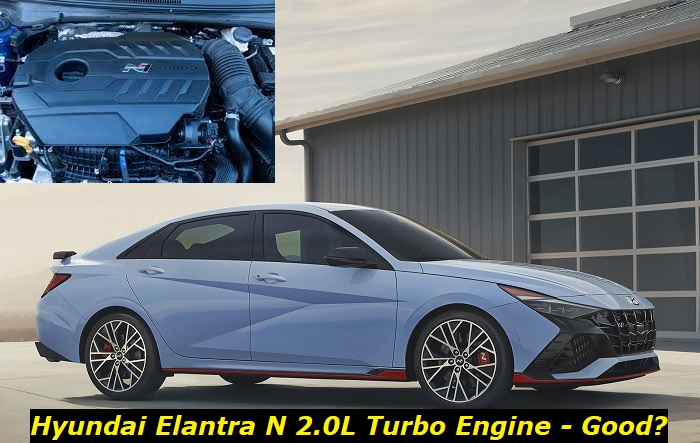If you are into performance vehicles, the Elantra has something to offer you. The N version of the new Elantra is just like the Jetta GLI or Civic Type R - the sporty version of the simple compact car. And the Elantra is actually worth your attention for being quite an affordable and very performance-oriented vehicle with a cool design.
Today, we'll tell you more about the Hyundai Elantra N 2.0L turbocharged engine. We'll see how good it is for this trim and also what its problems and disadvantages are. The engine is obviously the heart of the performance vehicle, so the 2-liter Turbo powerplant will decide if the Elantra N has some chance to be the star of the emptying market of aggressive compact sedans.

Key facts and my opinion about the engine
- Production years: 2010-now
- Average lifespan of G4KH: 150,000-170,000 miles
- Fuel supply type: direct injection
- Power range: 240-280 hp
- Fuel efficiency: average
- Engine block material: aluminum
- Engine reliability score: medium
- The most common problems: balance shafts problems, lubrication issues, E-CVVT problems in early years, carbon buildup on intake valves, a lot of minor issues.
Key facts about the Hyundai Elantra N 2.0L Turbo engine
The current (seventh) generation of the Elantra was presented in 2020 and started its sales in the US in 2021. It's obviously struggling to get the model back to the top charts in sales selling about 120,000 cars a year. That's not a lot for the Elantra that easily sold over 200K cars just 5 years ago. But still, it's one of the most prominent compact sedans on the market.
The Elantra N is the special version of the Elantra that has several important updates like 19-inch cool-looking wheels, performance brakes, great exhaust, stiff sporty suspension, sport seats, cool exterior add-ons, and also a sport steering wheel. But the most important change compared to cheaper trims is the 2.0L engine which is more than you expect for this vehicle.
Here's what you should know about this engine:
- this is the 2-liter 4-cylinder turbocharged codenamed G4KH that has been in production since 2010;
- the engine offers 276 horsepower and also 289 lb-ft of torque which is a lot for this relatively light and small car;
- the transmission options include the 6-speed manual transmission and also the 8-speed dual-clutch automatic transmission;
- the direct injection system (GDI) is here to make the engine more efficient;
- the engine is aluminum but it also has cast-iron sleeves in the block that make it a little more durable;
- the timing system is powered by the chain, and both camshafts have phasers (the Dual CVVT system is used for better performance);
- for this performance, the engine shows really good gas mileage - 22 MPG in the city and up to 31 MPG on highways.
Well, seems like a decent engine so far. Interestingly, this is the oldest engine that you can find under the hood of the Elantra. It has been there for more than a decade and this is the only non-Smartstream engine in this model. But this is more of good news because we know a lot about the engine and can predict its lifespan and most common problems.
The engine may seem like an old technology. Also, we have to admit that Hyundai didn't set the goal to maximize its power. 276 hp is not something you may dream of under the hood of the performance vehicle. But anyway, driving the Elantra N is a lot of fun. Especially if you get one with a manual transmission.
How long will the 2-liter turbo engine survive in the Elantra N?
Well, performance engines aren't made for durability. They are made for sport and fun. Anyway, Hyundai cared a lot about the quality of its engines back in 2010, so the company implemented several things that prolong the life of the G4KH unit. We've mentioned cast-iron sleeves in the block - simple, cheap, and efficient technology to make the engine block live twice longer than in all-aluminum units.
But still, the 2.0L Turbo engine in the Elantra N is going to have some fatal issues that reduce its estimated lifespan. We believe the fair estimate should be about 150,000 miles. It's still a lot for a performance engine but maybe this figure will spoil your mood a little.
When assessing the lifespan of this unit, we just have to look at all the common issues and serious problems that drivers have to deal with. Given the engine has been used in several Hyundai and KIA models, we know a lot about it and we know when these engines usually die.
But, at the end of the article, we'll also tell you some tips on how you can prolong the life of the engine and maybe drive it much longer than average.
What are the key problems with your 2.0L Elantra N engine?
Unfortunately, the list of common problems is not short. Hyundai made this engine trying to balance quality and performance. We fairly don't know why they didn't use a more modern Smartstream engine in the Elantra N, but this is something we can't answer.
Anyway, the G4KH Theta engine has its advantages and you shouldn't think that all of the problems listed below are inevitably going to happen with your engine. So, here are the common issues that happen with 2.0L Turbo units in the Elantra N:
1. Rod bearings failure
These engines are not going to be driven calmly. They are revved up like crazy and are used for fast acceleration and high-speed driving. This means some parts of the engine will overheat and get poor lubrication. Rod bearings are the weak link in the system. We've seen hundreds of reports of rod bearing failure in the G4KH engines and we also know that the repair is too expensive.
Rod bearings fail because of driving style. So please remember that you didn't buy a Ferrari. It's just a Hyundai that can drive a little faster than a cheaper Elantra.
2. Phaser failures
Duel CVVT systems in Hyundai are traditionally pretty reliable. But this engine has some issues with phasers. There even was a recall before the engine was installed in the Elantra N. We hope Hyundai solved the problem and you won't need to repair your turbo engine. But it's still worth paying attention to phasers when inspecting your engine on regular maintenance.
Phasers may also fail because of poor oil pressure. So, if you locate this problem, also check the oil pump as this is one more problem that may be called common for this engine.
3. Excessive oil consumption
This is the problem you will not do anything with. The engine block is not actually meant for sport, so it may overheat and change its shape a little. After that, cylinders will squeeze a little and form more like ovals, not circles. After cooling down, the engine will be OK. But in the process of aggressive driving, it may burn a lot of oil because of this issue.
Aggressive driving and overheating - are two of the worst factors that can ruin your Elantra N engine pretty fast.
4. Timing system issues
The timing chain may go bad pretty fast. When it stretches, you should replace it as soon as possible. Otherwise, it will jump and your valves will have an unpleasant meeting with the pistons. This will obviously affect the valves and the engine will get stuck. Repairs after that may cost almost as much as the replacement engine.
Also, pay attention to minor issues like oil leaks, sensors failure, direct injection issues (carbon buildup on valves). They may quickly develop into major problems and kill your engine fast.
How can you prolong the life of this Elantra N engine?
Driving your Elantra N for more years and miles is possible. But you should remember that this is not a sports car. This is just a simple compact sedan that is prepared for driving with more fun. But if you try to compete with a real sports vehicle on the road or you rev up the engine till it reaches the red line, you will probably kill this engine sooner than you expect.
We have some tips that will help you use your Elantra N 2.0L G4KH engine much longer:
- avoid badly aggressive driving;
- avoid revving up the engine till it reaches the red line;
- use Hyundai oil and filters, regular maintenance is very important;
- any minor issues should be addressed immediately;
- warm-up this engine before you start driving.
One of the most common mistakes is pressing the gas pedal hard before the engine reaches its normal temperature. Warm it up for 20-30 seconds before you start driving. Also, drive it for 5 minutes very calmly before you start using all the benefits that it can give you.
So, overall, the 2.0L Turbo in the Elantra N is a good engine and it can be durable if used wisely. But, as with any other performance engine, it has several problems that should be considered if you already own or are planning to buy this vehicle.
About the authors
The CarAraC research team is composed of seasoned auto mechanics and automotive industry professionals, including individuals with advanced degrees and certifications in their field. Our team members boast prestigious credentials, reflecting their extensive knowledge and skills. These qualifications include: IMI: Institute of the Motor Industry, ASE-Certified Master Automobile Technicians; Coventry University, Graduate of MA in Automotive Journalism; Politecnico di Torino, Italy, MS Automotive Engineering; Ss. Cyril and Methodius University in Skopje, Mechanical University in Skopje; TOC Automotive College; DHA Suffa University, Department of Mechanical Engineering






Add comment